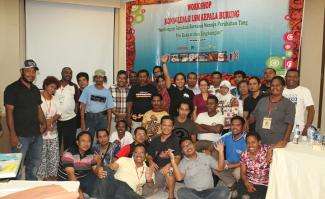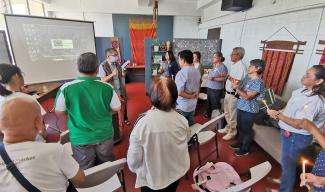NGOs from Bird's Head Peninsula Consolidate in West Papua
Posting Date
In 2001, West Papua formally separated from Papua to form Indonesia's 33rd province. With the formation of the new province, the four districts and one municipality have since been reconfigured into 11 districts and one municipality. New administrative regions are, further, likely to be formed under demands of more fair and equitable development.
To anticipate better addressing the immediate needs following the creation of new administrative areas, 28 non-governmental organisations (NGOs) in West Papua held a consolidation meeting on 22-24 May 2014 in Sorong, West Papua. The consolidation meeting focused on strengthening community involvement and reducing negative impact in the development of various policies, spatial planning, and in the allocation, use, and overall management of natural resources. The meeting was hosted by the KAMUKI Association, supported by two facilitators, and attended by 28 participants.
“In this meeting we will share the obstacles, difficulties, and challenges faced by NGOs in West Papua in their community and environmental work, said Sena Aji BD Handoko, Director of KAMUKI during his opening speech.
NGO consolidation in West Papua is a prerequisite to ensure that communities are actively involved and able to obtain the greatest benefit from development efforts. As well, successful consolidation can help minimalize ecological destruction, and help clarify the position and role of NGOs in development implementation. In particular, this consolidation effort focused on discussing issues concerning communications, resources distribution, independence, and social work ethics.
This effort is in acknowledgement of the continued reality, where NGOs still face recurring issues of competition of resources, lack of assurance of harmonization and avoidance of duplication, and differing methods of ensuring accountability and representativeness as appropriate. Proper harmonsiation supports better capturing and consolidation of the composite efforts of NGOs, and can support better communication from community partners to government and the general public on key issues.
The three-day event was facilitated by Julia Kalmirah and Joko Waluyo (from Indonesia Partnership) and focused on sharing information relevant to organizations working in West Papua, understanding trends in West Papua, and developing collaborative strategies and work distribution. The specific issues raised include spatial planning, health, human rights, and education issues. As well, concerns of organizational independence was also repeatedly raised by participants.
In sum, the 28 NGOs that attended the consolidation include: BELANTARA, YSA, YAPARI, PBHKP, LP3, BUNGA PAPUA, PENYU PAPUA (Sorong). LMA Malamoi, GEMAPALA, YAMIKO, GEMPAR, YASOBAT (Fakfak), WAPARASI (Raja Ampat), BIN MADAG HOM (Bintuni). KAMUKI, MNUKWAR, PERDU, PT PEDULI SEHAT, LP3BH, PARADISEA, JASOIL, JANGKAR, BENTARA, LDIP, and JAV (Manokwari).
To anticipate better addressing the immediate needs following the creation of new administrative areas, 28 non-governmental organisations (NGOs) in West Papua held a consolidation meeting on 22-24 May 2014 in Sorong, West Papua. The consolidation meeting focused on strengthening community involvement and reducing negative impact in the development of various policies, spatial planning, and in the allocation, use, and overall management of natural resources. The meeting was hosted by the KAMUKI Association, supported by two facilitators, and attended by 28 participants.
“In this meeting we will share the obstacles, difficulties, and challenges faced by NGOs in West Papua in their community and environmental work, said Sena Aji BD Handoko, Director of KAMUKI during his opening speech.
NGO consolidation in West Papua is a prerequisite to ensure that communities are actively involved and able to obtain the greatest benefit from development efforts. As well, successful consolidation can help minimalize ecological destruction, and help clarify the position and role of NGOs in development implementation. In particular, this consolidation effort focused on discussing issues concerning communications, resources distribution, independence, and social work ethics.
This effort is in acknowledgement of the continued reality, where NGOs still face recurring issues of competition of resources, lack of assurance of harmonization and avoidance of duplication, and differing methods of ensuring accountability and representativeness as appropriate. Proper harmonsiation supports better capturing and consolidation of the composite efforts of NGOs, and can support better communication from community partners to government and the general public on key issues.
The three-day event was facilitated by Julia Kalmirah and Joko Waluyo (from Indonesia Partnership) and focused on sharing information relevant to organizations working in West Papua, understanding trends in West Papua, and developing collaborative strategies and work distribution. The specific issues raised include spatial planning, health, human rights, and education issues. As well, concerns of organizational independence was also repeatedly raised by participants.
In sum, the 28 NGOs that attended the consolidation include: BELANTARA, YSA, YAPARI, PBHKP, LP3, BUNGA PAPUA, PENYU PAPUA (Sorong). LMA Malamoi, GEMAPALA, YAMIKO, GEMPAR, YASOBAT (Fakfak), WAPARASI (Raja Ampat), BIN MADAG HOM (Bintuni). KAMUKI, MNUKWAR, PERDU, PT PEDULI SEHAT, LP3BH, PARADISEA, JASOIL, JANGKAR, BENTARA, LDIP, and JAV (Manokwari).




